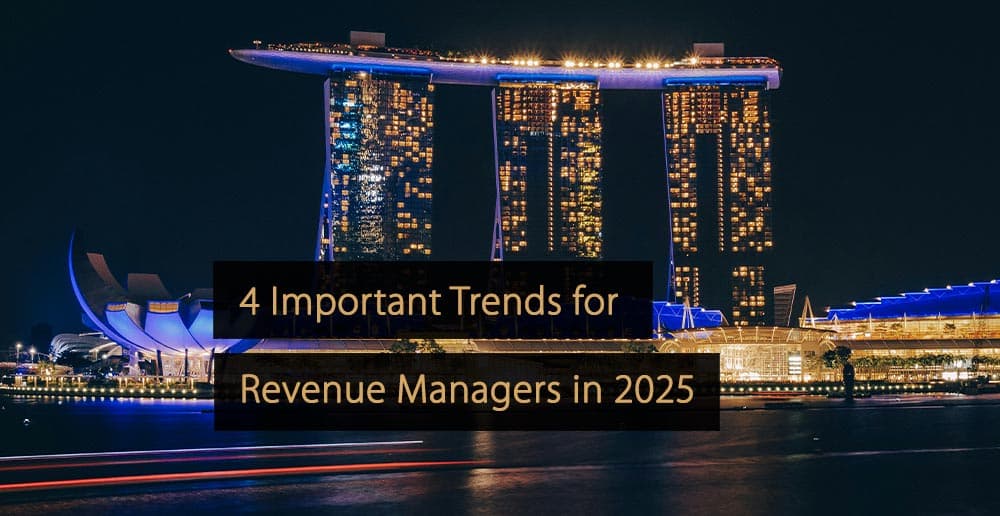In recent years, the hospitality industry has navigated unique challenges. As we forge ahead into 2023 and 2024, the landscape of revenue management within this sector is undergoing transformative changes. These changes, crucial for adapting to new market conditions, enhancing efficiency, and aligning with customer preferences, notably accelerate technological integration.
Revenue Management Trends in the Hospitality Industry
This article delves into the emerging trends in revenue management for the next two years, emphasizing the growing importance and interest in revenue management software in the hotel industry.
Technological Integration for Enhanced Efficiency
A standout trend for 2023-2024 in revenue management is the rapid embrace of technology. Hoteliers globally are realizing the critical role of tech solutions in adapting to the dynamic industry landscape, underscored by the pandemic’s emphasis on efficiency and cost management. This leads to significant investments in automated systems and advanced Revenue Management Systems (RMS) noted for their high automation capabilities. These systems offer data-driven insights for better pricing, inventory management, and resource allocation decision-making.
Strategies for Omni Data Channel Mastery
Modern RMSs are expected to flawlessly integrate and analyze data from multiple sources, reflecting the emerging omni-data channel excellence strategy. This approach should permeate the entire technological infrastructure of hotels. By synthesizing data from diverse sources like future demand, reservation patterns, inventory levels, and competitor analysis, hotels can obtain a holistic market view, aiding in optimal pricing strategies and competitive positioning.
Embracing Total Revenue Management (TRevPar)
In 2023-2024, the TRevPar concept will become prominent, pushing hotels to consider revenue streams other than room revenue. This approach considers all revenue streams, including F&B, parking, spa services, etc., to maximize profitability. TRevPar, as a KPI, assesses the effectiveness of space utilization for revenue generation, opening avenues for profitability across various hotel operations.
Expanding Beyond Traditional Sectors
Revenue management principles are expanding beyond hotels to industries like sports, theaters, cinemas, museums, and restaurants. This broad application will assist various organizations in optimizing pricing and maximizing financial performance.
Why Invest in Revenue Management Software?
With the trends and predictions for 2023-2024 outlined, it becomes evident why investing in RMS is crucial for the hospitality sector:
- ROI through Revenue Generation: RMSs use advanced algorithms to optimize room rates, enhance revenue, and prevent losses from underpricing.
- Improved Demand Forecasting: RMSs help hotels predict demand fluctuations, allowing for better resource and staffing management.
- Competitive Edge: Data-driven insights from RMSs enable smarter pricing strategies, enhancing market share and guest attraction.
- Operational Efficiency and Cost Reduction: RMSs streamline operations, saving time and labor costs and reducing the need for manual data handling.
Software Advantages and Business Impact of a modern RMS
- Real-Time Price Optimization: Modern RMSs adjust room rates dynamically, ensuring competitive pricing and maximizing RevPAR.
- Data-Driven Insights from Multiple Sources: RMSs integrate various data sources for balanced rate adjustments and market alignment.
- Simplified Data Management: RMSs present complex data in user-friendly formats, aiding decision-making.
- Understanding Price Elasticity: RMSs provide insights on price elasticity compared to competitors, which is crucial for revenue maximization.
Industry Expert Opinions
Industry leaders underscore the significance of RMS in the hotel sector:
“Empowering businesses with data-driven foresight, revenue management software pioneers the future of profitability, where every choice is optimized, and success is no longer a chance for hotels, but a meticulously calculated journey.”, Jordan Hollander, Co-Founder, Hotel Tech Report
“In 2023, using revenue management software is more than a choice for hotel real estate companies; it’s a smart plan for success. These tools help hotels set the right prices and understand what guests want. By using data and technology like AI, hotels can make better decisions, stay ahead of competitors, and create experiences that keep guests coming back. Investing in these pieces of software is like putting a strong foundation under a building. It helps hotels grow, keeps them strong in a changing market, and sets them up for a bright future. AI and human strategic thinking work together to improve forecasting and boost asset value. It doesn’t replace your revenue manager but strengthens their abilities.”, Thibault Catala, Founder and Managing Director, Catala Consulting
The hotel industry’s revenue management will evolve in 2023- 2024 with tech integration, total revenue focus, and sector expansion. RMS investments are now essential for revenue growth, better forecasting, competitive edge, and efficiency.
Free Guide: Revenue Management Software Guide
As the world of hospitality transforms, revenue management software empowers hotels to keep pace with emerging industry shifts. With the accelerated adoption of cutting-edge technology, hotels gravitate towards highly automated systems to boost decision-making and streamline operations.
Click here to download the “Revenue Management Software Guide”.
More Tips to Grow Your Business
Revfine.com is the leading knowledge platform for the hospitality and travel industry. Professionals use our insights, strategies, and actionable tips to get inspired, optimize revenue, innovate processes, and improve customer experience.Explore expert advice on management, marketing, revenue management, operations, software, and technology in our dedicated Hotel, Hospitality, and Travel & Tourism categories.








Leave A Comment